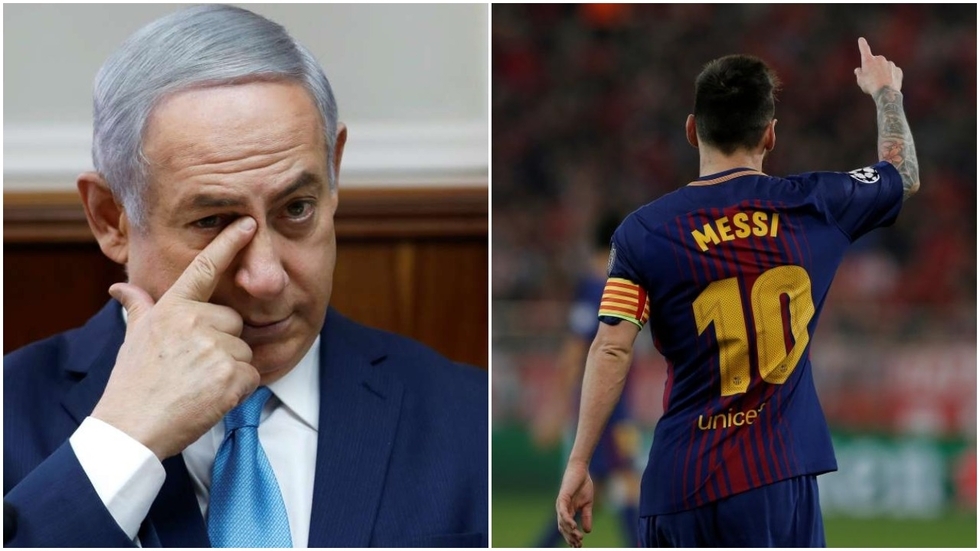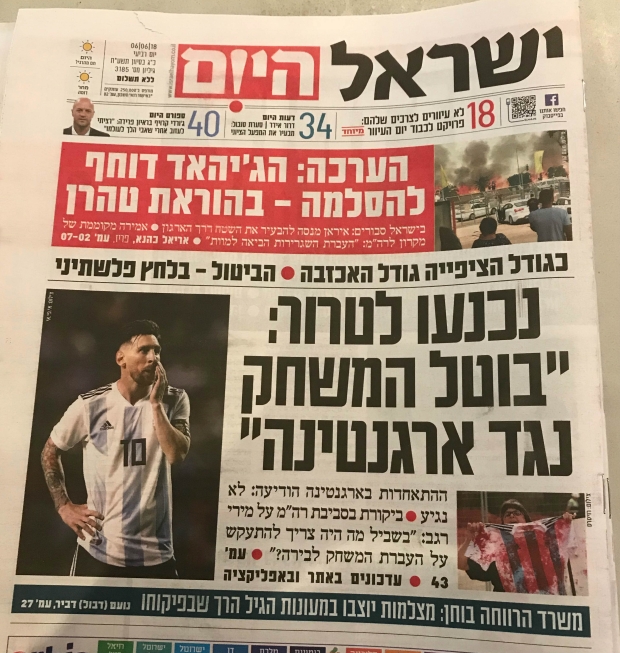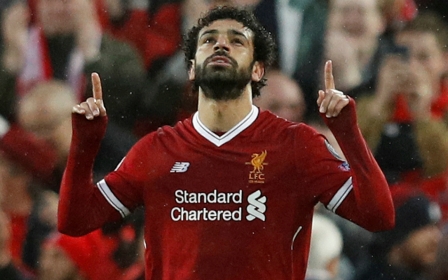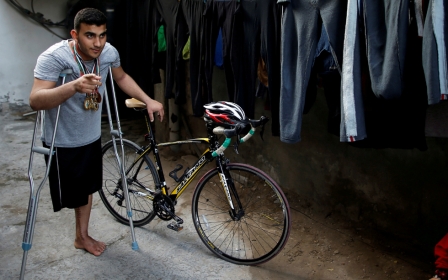Israel searches for scapegoat after Argentina match called off

Israeli ministers and media reacted with fury to Argentina's decision to pull out of a football friendly in Jerusalem, blaming anti-Semitism, Palestinian interference and death threats against Argentina forward Lionel Messi.
The prime minister, Benyamin Netanyahu, tried to play down the cancellation of Saturday's match with Israel, saying "We are moving on, guys".
President Reuven Rivlin described the news as "a sad morning for fans, including my grandchildren... but there are values bigger than Messi".
Rivlin also said he was concerned by the "politicisation" of Argentina's decision.
But the culture minister, Miri Regev, accused Palestinians of interfering, accusing them of terrorism, and even evoking the massacre of Israeli Olympians at Munich in 1972 as a comparison.
And the outspoken Avigdor Lieberman, Israel's defence minister, said Argentina had caved in to "Israeli-hating... anti-Semitic terrorist supporters" by calling the game off.
Translation: It's too bad the football players of Argentina did not withstand the pressure of the Israeli-hating inciters, whose only goal is to impinge our basic right to self-defence and bring about the destruction of Israel. We will not yield before a pack of anti-Semitic terrorist supporters.
Argentine newspaper Clarin reported that the Argentinian Football Association had made the decision after learning "players don't want to play in Israel because of threats against Messi" - and that the decision was not political or in any way linked to the Israeli occupation of Palestinian land.
Nevertheless, Palestinian officials came under attack in Israeli media for their alleged roles in the decision, with fingers pointing at Hosni Abdel Wahid, the Palestinian ambassador in Buenos Aires.
Hebrew media reported that Abdel Wahid had drawn a comparison between Israel's occupation of Palestine and British rule of the Falkland Islands. Argentina, which claims the Falklands as sovereign territory, invaded in 1982 but was defeated by a British expeditionary force.
ِAbdel Wahid said Argentina's involvement in a celebration of Israeli independence would be similar to Palestinians celebrating the occupation of the Falklands by the British.
'Argentina and several other Latin American countries know very well how football was used by their respective military dictatorships in order to whitewash their grave and systematic human rights violations' - Jibril al-Rajoub, head of PFA
Jibril al-Rajoub, the head of the Palestinian Football Association (PFA), was also criticised for his role in calling for the cancellation of the match which included drawing comparisons between the use of football during Argentina's "Dirty War" of the 1970s to conceal human rights abuses.
Argentina hosted and won the 1978 World Cup at a time when the country was under military rule, and thousands of political dissidents had been imprisoned and killed.
Rajoub wrote a letter a month ago to Argentinian Football Association asking them to cancel the match, Haaretz reported.
"Argentina and several other Latin American countries know very well how football was used by their respective military dictatorships in order to whitewash their grave and systematic human rights violations," Rajoub wrote.
Rajoub also said match had initially been scheduled to take place in Haifa but had been moved to Jerusalem as part of Israeli celebrations marking 70 years since the country declared its independence.
Rajoub said that football should be kept away from politics.
In an interview on Hebrew site Walla, he described Argentina team's decision as a slap for the Israeli government "that paid millions in order to move the match to Jerusalem, so Netanyahu and Regev [could] take a photo with Messi and Argentinian stars, but Messi and the team slapped Israel's fascism, Nazism and racism", Rajoub said.
A handshake with Messi
The role of the Palestinian Campaign for the Academic and Cultural Boycott of Israel (PACBI) was downplayed by Israeli officials and newspapers, although PACBI was the driving force to persuade Argentina team to withdraw from the football match scheduled for this Saturday.
The decision was welcomed by Argentine striker Gonzalo Higuain, one of the country's highest-profile players, in an interview with the ESPN television network on Tuesday.
"They've finally done the right thing," Higuain said. "Rationale and health come before everything else. We think it's best not go to Israel."
The match was scheduled this Saturday in Jerusalem's Teddy Kollek Stadium, which is built on the site of a former Palestinian village al-Malha and is close to the separation wall between Israel and the West Bank, and was to be Argentina’s final game before they kick off their World Cup campaign against Iceland on 16 June in Russia.
Hebrew news site Makor Rishon said that Israeli media agree that Argentina refused to go to Jerusalem because of the political propaganda of Miri Regev, the minister of culture and sport.
Regev has been accused of conditioning a cash payment for the football match organisers in order to take a photo op with Messi.
The head of Knesset State Control Committee said on Monday that the ministry of culture and sport, headed by Regev, agreed to pay the match organisers 2.6 million shekels ($730,000).
This would be on the condition that minister Regev be given an “active role” in the event between Israel and Argentina, including a handshake with Messi on the pitch, and a press conference.
Regev’s chief of staff denied the charge.
Also, Israeli media discovered last week that out of 30,000 tickets to the nixed match, just a third were put on public sale, whereupon they sold out in 20 minutes.
Israel state comptroller’s office agreed to open an investigation into the ticket sales.
Yair Lapid, the head of Yesh Atid party, summarised Israel's blame saying that "the biggest problem of this government that everything is a gig".
"The match tickets [were sold] in black-market, the battle with BDS was moved to the ministry of public security for political reasons, minister of culture wearing the mask of a minister of foreign affairs just to be in front of cameras. In the end, no one did the job, and Argentina is not coming to Israel," Lapid said.
Yisrael Hayom described the campaign to cancel Argentina match as "terrorism".
"Subjected to terrorism: the match against Argentina nixed" was the newspaper's headline.
It said that Netanyahu sent a letter to Argentina's President Mauricio Macri, three months ago, asking him to move the match field to Jerusalem.
Netanyahu refused to move the match back to Haifa, in a telephone conversation between him and Regev yesterday, according to Yisrael Hayom.
Israel's embassy in Buenos Aires confirmed the international friendly was off as reports of the cancellation spread through the Argentinian media on Tuesday night.
"The Israeli embassy is sad to announce the suspension of the match between the Israel and Argentina national teams scheduled for Saturday 9 June, as a warm-up game for the Russia World Cup," the statement said.
It said the decision was due to "threats and provocations" against Lionel Messi, Argentina's captain and star player, but gave no specific details.
Translation: The Israeli embassy regrets to announce the suspension of the match between the national teams of Israel and Argentina which was scheduled for next Saturday 9 June, as a warm-up game before the World Cup in Russia.
More blame
"What happened here, truthfully, is less about the boycott. There's a good friendship with Argentina, terrific relations. Due to violent incitement and threats by Jibril Rajoub and the whole bloodied jerseys charade, fear rose for the personal safety and the players started to fret over being physically assaulted in Jerusalem," Gilad Erdan, the public security minister, told Israeli radio on Wednesday.
Argentina has made four previous pre-World Cup stop-overs in Israel since 1986. Most countries do not recognise either Israeli or Palestinian sovereignty in Jerusalem and have their embassies to Israel in the Tel Aviv area.
However, three Latin American countries - Guatemala, Honduras and Paraguay, which borders Argentina - followed the US lead in moving their embassies last month.
New MEE newsletter: Jerusalem Dispatch
Sign up to get the latest insights and analysis on Israel-Palestine, alongside Turkey Unpacked and other MEE newsletters
Middle East Eye delivers independent and unrivalled coverage and analysis of the Middle East, North Africa and beyond. To learn more about republishing this content and the associated fees, please fill out this form. More about MEE can be found here.





